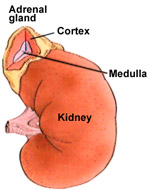
Addison's disease:
Addison's disease (also called as Hypoadrenocortisim) is caused by a lower than normal production of steroid (corticosteroids) hormones (Glucocorticoid and Mineralocorticoid) by the adrenal glands in the body. This disease was first identified by Dr. Tomas Addison in 1885.
The two adrenal glands present atop each of the two kidneys are responsible for secreting hormones that affect virtually every organ and tissue system of our body.
Addison's affects both men and women and has serious life-threatening complications if left untreated. Though children are affected, a majority of affected persons are in the 3rd to 5th decades of life.
Symptoms:
The symptoms of Addison's disease develop slowly over a period of time and the patient may show some or all of these symptoms:
- Fatigue grows worse over a period of time.
- Weight loss in spite of eating well
- Muscle weakness that doesn't improve
- Patchy discoloration of the skin most visible on scars; skin folds; pressure points such as the elbows, knees, knuckles, and toes; lips; and mucous membranes.
- Low blood pressure
- Cravings for salt
- Nausea, vomiting, and diarrhea are seen in 50% of patients.
- Irritability
- Depression
- Low blood sugars
- Moderate Hair loss
- Irregularity or sudden stoppage of the menstrual cycle.
 Occasionally, untreated Addison's can present itself with sudden onset of symptoms (Addisonian crisis):
Occasionally, untreated Addison's can present itself with sudden onset of symptoms (Addisonian crisis):
- Pain in the lower back, abdomen, and legs
- Severe vomiting and diarrhea leading to dehydration
- Very low blood pressures
- Loss of consciousness
Physical stress, injury, and any infection or illness can precipitate an Addisonian crisis that needs emergency management.
Types and Causes
Near-total or total destruction of both adrenal glands results in loss of both cortisol and aldosterone secretion causing classical Addison's disease. Yet, most commonly, one of the two types predominates.
Primary adrenal insufficiency:
It is one type of Addison's disease, resulting from the body's immune system attacking its own cells since it fails to identify the adrenals as part of the body's own cells (auto-immune).
Here the tissues of the adrenal glands are attacked by the body's own immune system thus killing them. This eventually causes reduced to complete failure of production of the adrenocorticoid hormones.
Other factors causing primary adrenal insufficiency are:
- Infections of the adrenals
- Spread of cancer to adrenals
- Bleeding into the adrenals
- Tuberculosis.
Secondary adrenal insufficiency:
It is the second type of Addison's disease. The functions of the adrenals are very much under the control of a higher hormone controlling gland called 'the pituitary'. This gland is situated deep within the brain and secretions from it regulate the activity of the adrenals. Diseases affecting the pituitary cause reduced activation of the adrenals, producing insufficiency.
Sudden stoppage of corticosteroids used in the treatment of medical conditions like asthma or arthritis can also precipitate secondary adrenal insufficiency.
Diagnosis:
The disease is hard to diagnose in its early stages making laboratory investigations extremely necessary for confirming the diagnosis. Biochemical test of hormones (ACTH) and their regulatory hormones (CRH-from the pituitary) form the mainstay of diagnosis.
ACTH Stimulation Test:
This is the most specific test for diagnosing Addison's disease. The normal response after an injection of ACTH is a rise in blood and urine cortisol levels. Patients with either form of adrenal insufficiency respond poorly or do not respond at all.
CRH Stimulation Test:
When the response to the short ACTH test is abnormal, a "long" CRH stimulation test is required to determine the cause of adrenal insufficiency. Patients with primary adrenal insufficiency have high ACTHs but do not produce cortisol. Patients with secondary adrenal insufficiency have deficient cortisol responses but absent or delayed ACTH responses. Absent ACTH response points to the pituitary as the cause; a delayed ACTH response points to the hypothalamus as the cause.
Other diagnostic tests that may be required:
- Tuberculin tests to rule out tuberculosis
- Abdominal X-rays to check for calcium deposits in the adrenals which imply tuberculosis.
- CT scans to check for abnormalities in the pituitary when secondary adrenal insufficiency is suspected.
Treatment:
Conservative management:
The conventional treatment essentially consists of substituting the hormones that are insufficiently produced by the adrenals.
- In aldosterone deficiency, oral doses of a mineralocorticoid called fludrocortisone are given once a day with additional advice to increase salt intake.
- The doses are adjusted as per the patients' body requirements.
- Since in secondary adrenal insufficiency, the aldosterone levels are maintained, these patients do not require aldosterone replacement therapy.
- Pregnant women suffering from adrenal insufficiency are managed by replacement therapy.
Addisonian Crisis:
An Addisonian crisis is a life-threatening situation. It presents as
- Low blood pressure,
- Low blood glucose, and
- High levels of blood potassium
Conventional treatment:
- Hydrocortisone injections
- Intravenous saline
- Intravenous glucose supplements (dextrose)
Other necessary precautions that the patient is made aware of constituting the following:
- Always carry identification stating his or her condition in case of an emergency.
- The card should alert emergency personnel about the need to inject 100 mg of cortisol if its bearer is found severely injured or unable to answer questions.
- The card should also include the doctor's name and telephone number and the name and telephone number of the nearest relative to be notified.
- When traveling, a needle, syringe, and an injectable form of cortisol should be carried for emergencies.
- A person with Addison's disease also should know how to increase medication during periods of stress or mild upper respiratory infections.
- Immediate medical attention is needed when severe infections, vomiting, or diarrhea occur. These conditions can precipitate an Addisonian crisis.
- A patient who is vomiting may require injections of hydrocortisone.
Surgical management:
Surgical interventions are required in persons with secondary or chronic adrenal insufficiency.
Homeopathic Treatment:
Chronic and recurring Addison's disease can be treated with success using homeopathy. Long-term management of Addison's disease can best be achieved with a strategic combination of homeopathic therapy with conventional medicine. An acute crisis is better handled using the conventional treatment alone.
Written & Approved by-
Dr. Rajesh Shah
M.D. (Hom.)